Halcyon Home’s Amy Sweet is creating new communities.
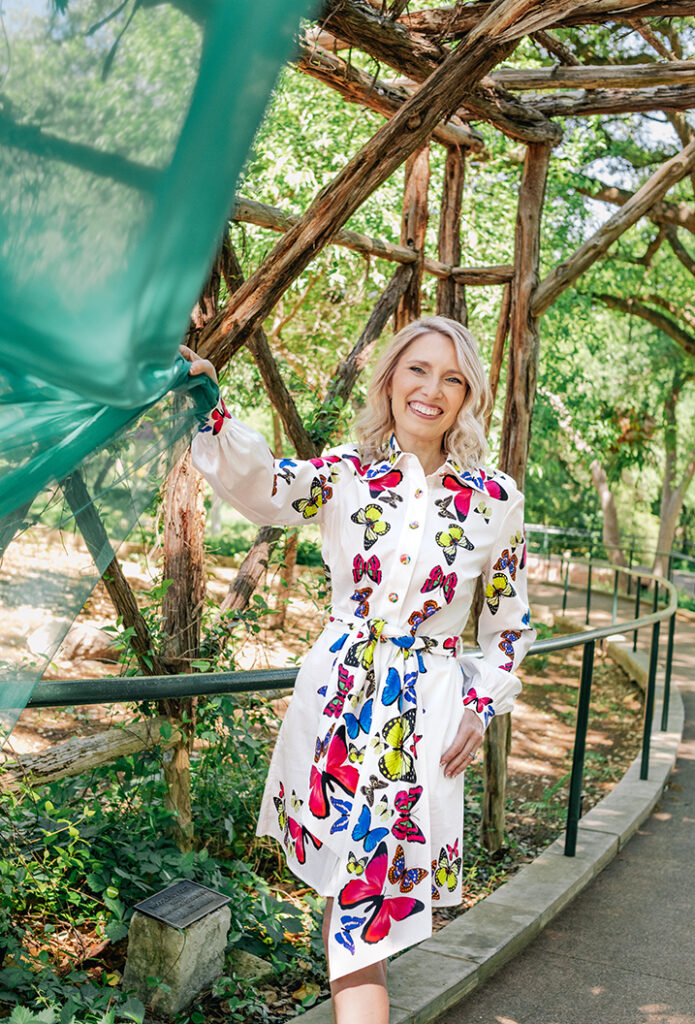
By Jenny Hoff. Photos by Joi Conti. Styled by Asma Parvez, with inspiration from Estilo and The Garden Room. Hair and makeup by Angelo Pegran. Shot on location at Zilker Botanical Gardens.
While most kids were setting up lemonade stands at 9 years old, Amy Sweet was baking a hundred loaves of bread every week and delivering them to neighbors on horseback.
“She would be baking bread in the kitchen with her mom and one day realized she could start a business with it,’” recalls her father, Sidney Sweet. “She hopped on her horse and went around the neighborhood. We were sort of homesteading; we built our own house and cut down our own trees. She has always been so driven to learn and explore and experience.”
Growing up with a strict Seventh Day Adventist upbringing, a snapshot of Amy’s childhood includes ankle-length dresses, a homeschool education, little money and an independent streak that often clashed with the rigid expectations placed upon her. Yet amidst the rustic simplicity of her upbringing, Amy cultivated a resourcefulness that would shape her future endeavors.
Today, Amy runs the fifth largest female-owned company in Austin, according to the Austin Business Journal, with 669 employees, around $40 million in annual revenue and thousands of customers across the region. In 2019, she won Austin Woman magazine’s Woman’s Way Business Award for health and wellness and in 2021 was an Ernst & Young national finalist for Entrepreneur of the Year.
Halcyon Home, named for a time of idyllic peace, is Amy’s brainchild, born not from the desire to start a multimillion-dollar empire, but from wanting to help her beloved aunt—a family member far removed from the world Amy had grown up in, but one who always believed in the spirited girl who wouldn’t take no for an answer.
A Hollywood Actress Inspires Halcyon Home
Eager to forge her own path and escape the yoke of a strict upbringing, by the time Amy was 16 years old, she was already working as a caregiver for elderly patients in their homes. She went on to become a physician’s assistant and even worked as a certified death doula. While she had left the Seventh Day Adventist community behind to live life on her own terms, she kept some of the more valuable lessons in her toolbelt. She had watched her father build successful businesses both within the church community and outside of it, learned from her mother how to be resourceful and disciplined and knew that no knowledge was beyond reach if she was ready to put in the work herself to acquire it.
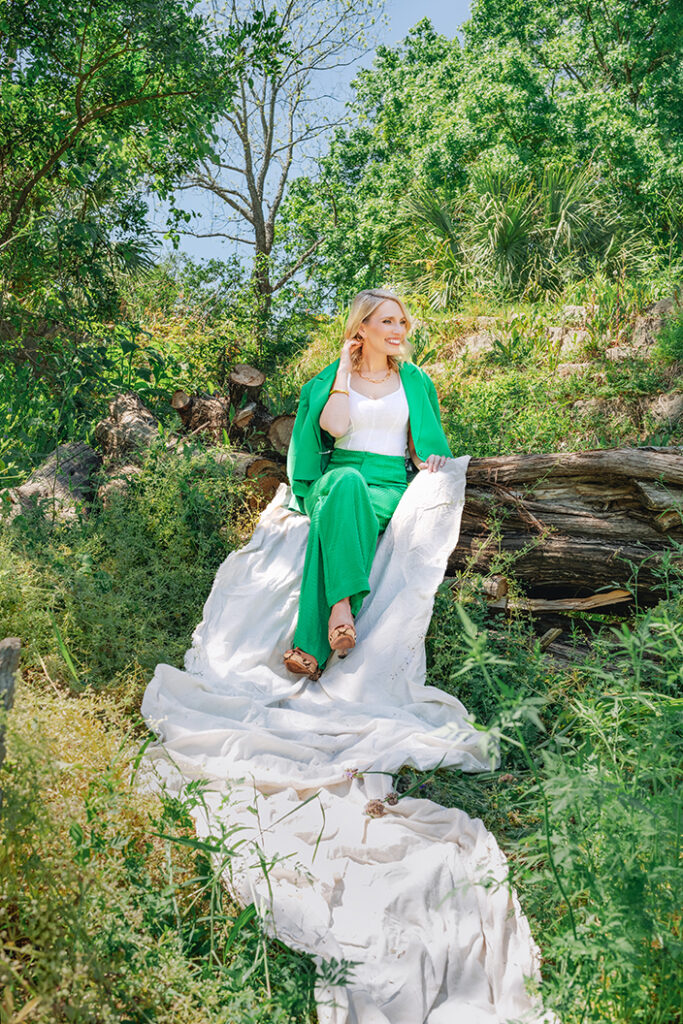
A voracious learner and intent on packing as much life into her years on Earth as possible, Amy says her experience with the terminally ill early on taught her to treat every day like a gift.
But perhaps most important in forging her future path was her relationship with her aunt, Susan Tyrrell, a former movie star with a vibrant and progressive outlook on life, who provided a much-needed perspective shift. Her aunt recognized Amy’s potential and had an unwavering belief in her ability to make a difference in the world.
“I needed someone in my life to say, ‘You can do it,’” says Amy. “My aunt always believed I could do anything. She said, ‘You will change the world; you have something most people do not have.’”
Tyrrell could spot talent when she saw it. An Oscar-nominated actress and artist who defied norms, lived life on her own terms, hung out with the likes of Andy Warhol, starred in an award-winning movie with Jeff Bridges and refused to let the disease that ravaged her body affect her ability to find joy and passion for life, she was her niece’s biggest cheerleader and inspiration. When she fell ill in her 50s, she made a then 21-year-old Amy her power of attorney. Even when the disease took her legs, she lived every day with gusto, impressing friends like megastar Johnny Depp, who threw her a party to help raise money for medical expenses.
“She was a prolific artist,” says Amy. “We had art shows at the Alamo, and her caregivers came. We did her funeral at the Alamo. She died in her 60s as vibrant as she had been in her 20s.”
When her aunt first needed home care, Amy, who by then was a physician’s assistant, was shocked to find no suitable options. The care provided met clinical needs but neglected the emotional needs of the patient. No one that an elderly or ailing patient could bond with and trust on a more personal level. No one who could keep up with her vivacious aunt.
“She loved to be around young people,” recalls Amy. “There just wasn’t a company that was finding young people who were inspiring to her and who also wanted to be inspired. It was people who were showing up as a job, not thinking, ‘How can we better each other’s lives?’”
Amy knew it was possible because she herself had done it. While working as a caregiver when she was 16, she felt that each interaction with a patient had gifted her something too. These were people who had lived vibrant and interesting lives; changed the world in their own way; built families, businesses and communities. They deserved to be seen, heard, respected and cared about. They were more than just a patient on a roster, but a human being who still could offer so much to someone in a different stage of life. Amy realized there was a huge demand for this kind of care and she could be the person to meet it.
So, when her aunt was nearing the end of her life, Amy, who was now married with two children, hired her first employee to step in and give her aunt “Su Su” the kind of friendship and care she deserved.
Tahaja Murphy distinctly remembers the day Amy offered her a job.
“I was working for a medical team as a caregiver for them when Amy walked in and talked about her services,” recalls Murphy. “My colleagues were telling her how good I was, and she said, ‘Do you want a job?’ I told her I already had a job, and she replied, ‘Do you want another one?’”
Murphy admits she had no idea what she was getting herself into but was drawn to the petite blonde’s infectious energy and beaming optimism. With a can-do spirit, born of her days selling bread atop her horse, Amy exuded the confidence of a successful CEO, even though at the time she was running every department of her new business alone.
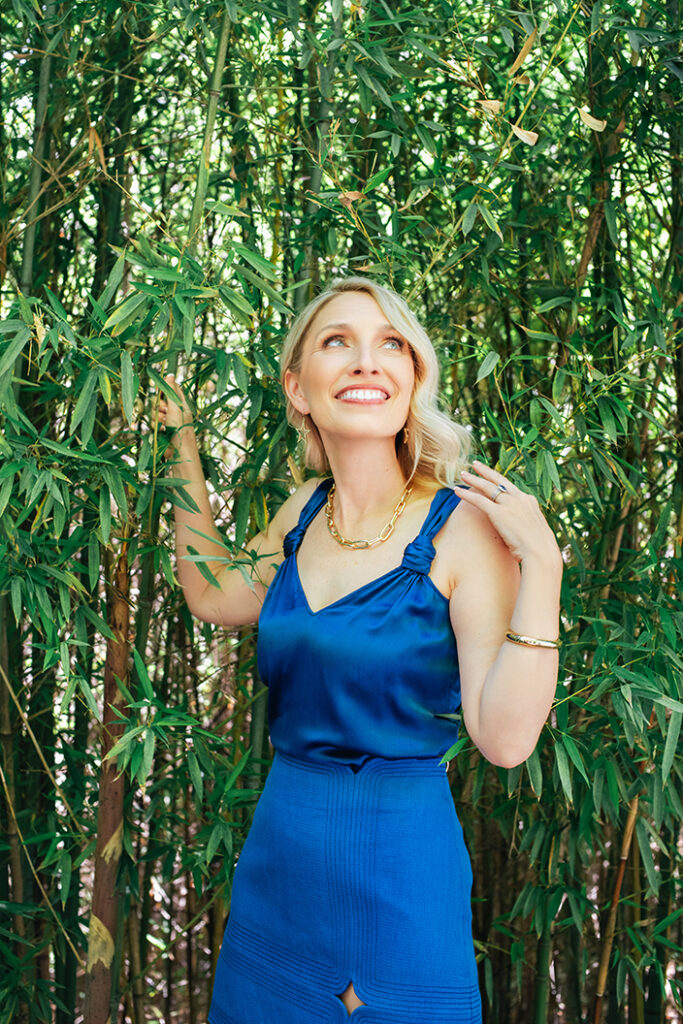
Murphy’s hunch to go with Amy turned out to be a good one. Her first assignment was unlike any patient she’d ever worked with: Susan Tyrrell came with a lot of spunk, a home filled with her original art and a parrot named Rico. When Tyrrell passed away six months after Amy founded her company, Murphy adopted Rico and took care of him until he was ready for a new home.
She then continued to work with Amy at Halcyon Home for 10 years, as the company grew from two people to hundreds. In 2020, she received her nursing degree, which Amy strongly encouraged her to pursue. With Amy writing her recommendation letters and helping in any way possible, Murphy says she knows she can still call Amy if she has a question and her former boss will always answer.
“I learned from her how to stay determined and go after whatever it is you want in life,” says Murphy.
Today, Amy continues to build bonds with her ever-growing staff, some of whom have been with her for more than a decade. She encourages them to grow in their fields and, like Murphy, pursue their dreams. She knows that the best caregivers are ones who feel cared about themselves.
“Even now, people ask what my strategy is, and I tell them that I just like taking care of people and helping caregivers become nurses and doctors,” says Amy. “My vision for this company has never been to get as big as it can, just to continue doing what we’re doing.”
Amy’s close friend Chitra Thankaswamy has known her since both of their children were in kindergarten together. She says Amy is the same in her personal life as her professional life: a resource for those she cares about, a problem-solver and a cheerleader for living life to the fullest. From taking scuba diving lessons together (where Thankaswamy was surprised to find out Amy had already been certified 20 years earlier) to group family vacations, she’s seen Amy pour herself into every experience she has.
“She’s busy, but she doesn’t want to let life pass her by, both for her family and her friends. She makes every effort to be present.”
As the senior vice president of marketing for Dell, Thankaswamy also admires her friend’s strong leadership skills and self-assuredness—a key to her company’s success.
“She is very decisive and doesn’t dillydally. Once she’s made a decision, she doesn’t mull on it forever.”
That decisiveness has helped Amy’s company grow exponentially over the last decade. Halcyon Home offers a variety of services for all stages of an elderly patient’s life. From picking up a client for lunch once a week to full-time in-home hospice care, Amy knows her work is making a true difference in not only patients’ lives but their families’ lives as well.
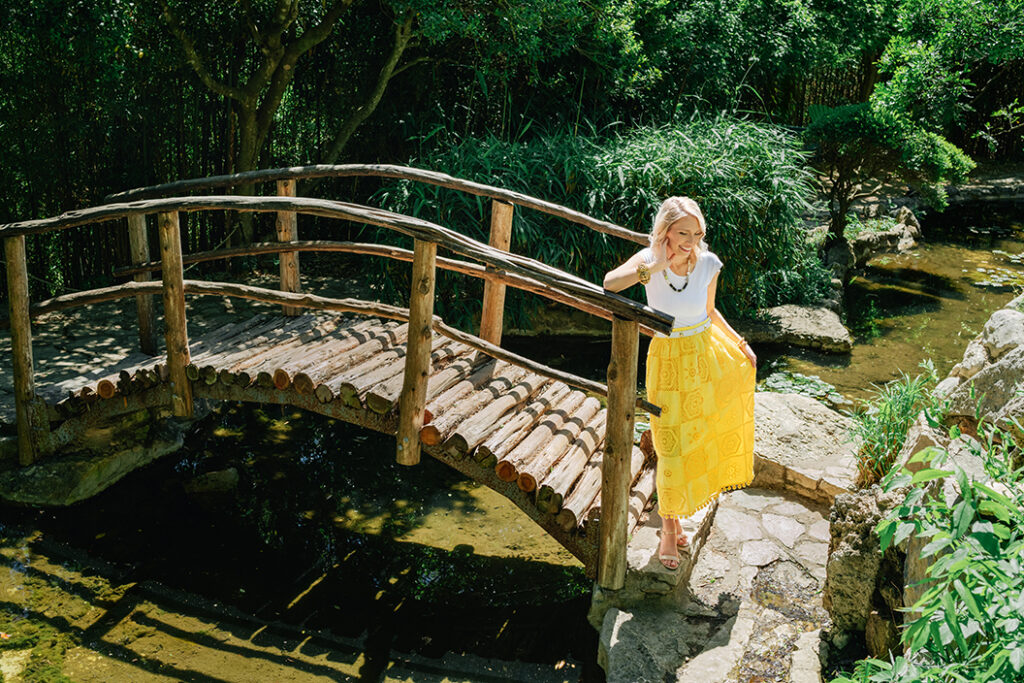
“Just the other day, I had someone stop me in the parking lot and ask me, ‘Are you with Halcyon Home? You gave my dad the best death,’” she says with pride.
The man’s comment about his father’s death is the whole reason Halcyon Home was born. Dying is inevitable, but as her aunt showed her, it doesn’t have to be filled with despair and sadness. Six months before her own death, Susan Tyrrell wrote in her journal, “I demand my death be joyful.”
Completing the Circle
Having witnessed many births and deaths over the decades, Amy has always been in awe of how much these two life stages have in common. Coming into the world is just as scary, difficult and full of wonder as leaving it is.
“We all die and are all born in a very similar energetic process,” she says. “I’ve been at many births and many deaths, and not at one have I not thought about another.”
This experience formed a dream in Amy of completing the circle of life in a way that still exists in much of the world but has dwindled in the U.S.: intergenerational communities. According to The Blue Zones, a book on longevity that features Loma Linda, a Seventh Day Adventist community and the singular group in the the country with a high rate of octogenarians, one aspect all of the “blue zones” have in common is a priority on family. As people get older, they are brought into the homes of their children and grandchildren and have both a support system and sense of purpose. Children benefit from exposure to older members of the community and vice versa.
With three children of her own, Amy has witnessed firsthand how exposing children to all stages of life is vital in releasing the fear of death and understanding the circle of life. She has also learned about the value in giving children responsibilities and purpose, which fosters their emotional and intellectual growth. Having read the work of Cameron Camp, Ph.D., who studied how the Montessori method of structure and a sense of purpose can not only benefit children but also adults who suffer with dementia, Amy is now working on a project that will bring these two communities together.
She believes in the value of intergenerational connectedness and has two big pieces of land to prove it. Before the pandemic, which affected elderly care centers and services almost more than any other industry, Amy had already laid the foundation for her vision of an intergenerational community. She bought land in San Marcos and Waco and funded a Montessori school to educate children in a way that would allow them to explore and find independence while also taking on a sense of responsibility within a structured system. The school is now paid off and has a two-and-a-half-year wait-list.
The next step for the complex is to have an elderly care center surrounded by land so family members who can’t necessarily take an elderly parent or grandparent into their own home can provide care for their loved one while having their children at the Montessori next door. The community is meant to provide ample opportunities for the elderly and children to interact. Working parents will be able to come and have lunch with their kids, visit their own parents and experience a level of intergenerational living that works with their busy lifestyles.
While the pandemic, followed by the fall of Silicon Valley Bank, delayed Amy’s plans by a few years, her father is confident Amy will bring her vision to fruition just like every other project she has launched. And this isn’t just a father’s pep talk. He’s bet his money on it.
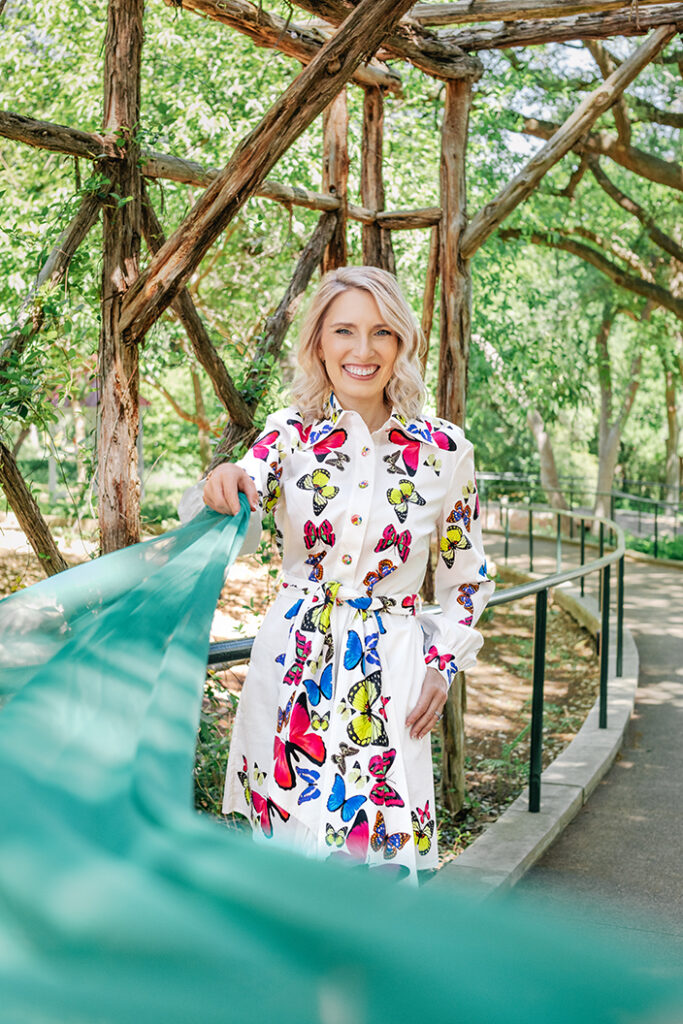
“It’s my single biggest investment,” says Sidney, who explains he saw early on his daughter understand the language of business. “The one quality that you absolutely must have to run a business is the ability to solve problems efficiently. The ability to take a punch, to recover, to go on is essential. As long as there is no COVID or Silicon banks in the next six months, she’ll get it launched. She always finds a solution and moves forward.”
While Amy was eager to leave her homestead lifestyle to join the modern world, she may be coming full circle herself. Her newest project is a tapestry of what she appreciates from the community she grew up in—self-reliance, community and a focus on health—and the lessons she learned from her aunt. Amy is fearless and unrelenting with her dreams to impact the world.
“Our whole culture is becoming shielded from hard work and from getting your hands dirty,” says Amy. “To be able to teach that hard work and caring for people has so much reward for your own spirit is inspiring. It’s showing people how the circle works.”


